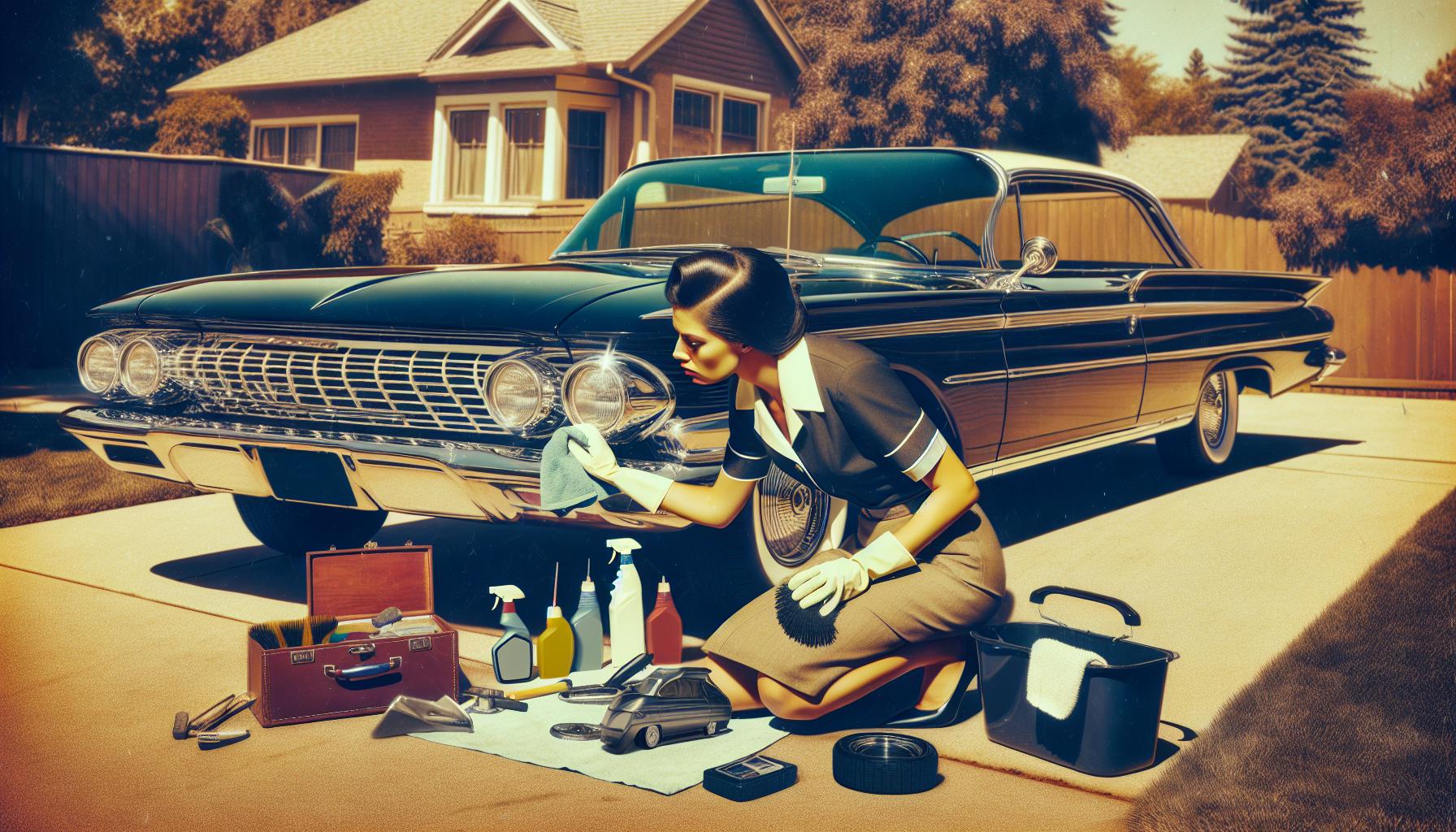
The automotive industry offers a variety of career paths, two of the most intriguing being car detailing and car mechanics. Both roles revolve around vehicles, yet they cater to different interests and skill sets. If you’ve ever wondered which path could boost your bank account more, you’re not alone. With car mechanics typically earning between $30,000 and $70,000 annually and detailers pulling in $25,000 to $60,000, the financial stakes are clear.
Car Detailing vs. Mechanic: What Makes More Money?
While mechanics often enjoy more stability and structure, especially in dealership settings, car detailing offers flexibility and entrepreneurial potential. Specializing in high-demand areas like electric vehicles can lead to higher income and job security for mechanics. Meanwhile, detailers who focus on luxury vehicles or run their own business might see their earnings soar. Understanding these dynamics is crucial for anyone looking to make an informed career choice in the automotive world.
what makes more money car detailing or a car mechanic
A car mechanic generally earns more than a car detailer. Mechanics earn between $30,000 and $70,000 annually, while detailers usually earn from $25,000 to $60,000. These figures depend on factors like experience, location, and specialization.
What Does a Car Mechanic Do?
Car mechanics focus on vehicle functionality, handling tasks from diagnosing issues to performing repairs. They work on mechanical and electrical systems, requiring not just technical know-how but also formal training, often holding ASE certifications. Key responsibilities include diagnosing and solving mechanical problems, replacing engines or brakes, performing maintenance tasks like oil changes, and using diagnostic tools for troubleshooting issues.
The skills necessary for this role include problem-solving abilities and a strong understanding of automotive technology. Mechanics often earn more when specializing in areas like electric or hybrid vehicles, with their salaries ranging from $30,000 at entry-level roles to $70,000 for seasoned professionals. Positions in dealerships or owning a shop can offer higher earnings potential and job stability. In my experience, these roles provide a structured work environment, catering to both technical challenges and customer service needs.
What Does a Car Detailer Do?
Car detailers focus on vehicle appearance, providing services that enhance both the interior and exterior. Tasked with duties like washing, waxing, polishing, and conditioning interiors, detailers require a strong attention to detail and knowledge of diverse cleaning products. They also offer advanced services such as ceramic coating or window tinting.
Successful detailers leverage creativity and physical stamina, sometimes working on high-end luxury vehicles or personalized projects. Earnings vary, with annual incomes ranging from $25,000 to $60,000, and the potential to earn more when running a personal business. Flexible hours and the potential for entrepreneurship make car detailing appealing for those with an independent streak. I found that this role allows for creative expression through customized service offerings, contributing to client satisfaction and personal business growth.
How Much Do Car Detailing Businesses Make?

Car detailing businesses present a lucrative opportunity in the automotive industry. Detailers earn between $25,000 and $60,000 annually, with the potential to exceed this range when focusing on high-demand services like paint correction or ceramic coatings. For instance, offering advanced paint correction can command fees between $1,000 and $2,000 per job, allowing operators to earn up to $400 an hour.
Operating a detailing business involves understanding industry dynamics. According to IBISWorld, the auto detailing sector, part of the $14.7 billion car wash and detailing industry, includes over 67,000 companies. The average detailing business generates around $220,000 in revenue. However, earnings vary widely based on specialization and business model. For example, GoDetail, a successful company in this space, reports revenue of approximately $900,000 annually, which is more than four times the industry average.
Consider profit margins: industry net income averages 17.1% of revenue, translating to about $37,620 for small business owners. Successful businesses can achieve gross profit margins of 60%, leading to a net income equivalent to 42% of revenue or over $300,000. Alan Tursunbaev, GoDetail’s founder, achieved a revenue increase of 50% within six months, highlighting the financial potential of effective business strategies.
Choosing this path offers flexible work arrangements with the freedom to set your schedule, embodying the potential of creating a custom lifestyle business.
Profitability Scenarios

Exploring different aspects of car detailing reveals various avenues to enhance profitability. Each method contributes uniquely to potential financial outcomes.
Mobile Detailing
Mobile detailing offers convenience to customers, sparing them from traveling. For business owners, starting costs remain low since infrastructure like a garage or shop isn’t necessary. With a mobile setup, flexibility in scheduling and location leads to more opportunities. Profits depend on customer volume, with prices for mobile detailing services ranging from $75 to $200 per vehicle. The right marketing strategy increases bookings and customer base.
Physical Shop
Operating from a physical location involves significant initial expenses—like leasing space and establishing infrastructure—but it provides a consistent revenue stream once established. Shops can offer a wider range of services, attract drive-in customers, and accommodate multiple vehicles simultaneously. With effective local marketing, a shop could see earnings between $150,000 and $300,000 annually, depending on location and service offerings.
Interior Detailing
Interior detailing stands out for thoroughness in cleaning the car’s interior components, such as carpets, upholstery, and dashboards. It capitalizes on the increasing interest in maintaining a vehicle’s interior. For example, services like stain removal and odor treatments can fetch between $100 and $300 per vehicle. Skillful execution ensures repeat business and customer referrals.
Fabric Protection
Fabric protection enhances interior detailing, offering long-term advantages by preventing stains and fading. Providing this service can be done at an additional cost, typically ranging from $50 to $150. Its profitability stems from the demand for maintaining interior appeal, particularly for high-end and luxury vehicles where fabric wear is more concerning.
Leather Cleaning and Conditioning
With half of new car buyers choosing leather upholstery, leveraging this preference is profitable. Offering services like leather cleaning and conditioning maintains leather’s quality, charging between $50 and $200 per session. The affordability of cleaning solutions against the service price creates effective profit margins.
Paint Correction
Paint correction addresses vehicle paint imperfections, restoring gloss and color. This service, requiring specialized techniques and tools, commands higher prices ranging from $300 to $1,000 per vehicle, depending on the extent of correction needed. Expertise in this area can set a business apart, justifying premium pricing for quality results.
Ceramic Coating
Ceramic coating offers long-lasting protection against environmental effects, enhancing vehicle appearance. This high-demand service involves applying an enduring layer, with pricing between $500 and $2,000 based on vehicle size and condition. The ability to elevate vehicle appearance dramatically attracts discerning clients willing to invest.
Headlight Restoration
Restoring headlight clarity enhances safety and aesthetics. This straightforward service can be performed quickly, with prices between $75 and $150 per vehicle. Given the ever-present issue of headlight fogging, it remains a consistent revenue generator in the detailing business.
Wheel Detailing
Focusing on wheels provides additional aesthetic value where grime and brake dust accumulate. Wheel detailing ensures rims remain clean and shiny, with service pricing around $50 to $150. Offering this service improves overall customer satisfaction and encourages comprehensive detailing packages.
Skills for a Mobile Car Detailing Business
In mobile car detailing, mastering logistics and client engagement is crucial. It involves managing time effectively, enhancing cleaning techniques, and resourcing the right tools. Building solid communication skills facilitates client trust and satisfaction.
Step 4. Choose a name

Selecting the right name sets the foundation for your car detailing or mechanic business. A well-chosen name enhances brand identity and attracts the right clientele.
Set Up a Dot Com
A unique and memorable name becomes more effective with an online presence. Registering a dot com domain achieves this by using affordable platforms like GoDaddy and Namecheap. Secure a domain closely matching your business name to ensure easier online discoverability. An available and simple spelling assists potential clients in finding your website, enhancing your online visibility.
Create a professional email address using your domain name. For example, use “info@yourbusinessname.com” instead of generic options like Gmail or Yahoo. This boosts credibility, especially when communicating with clients or partners. Purchase SSL certificates and select reliable hosting to ensure website security and performance. A secure, high-performing site reduces bounce rates and improves user experience for visitors inquiring about your services.
Lock It All In
After securing the domain, it’s crucial to protect the brand name legally. Trademark registration prevents competitors from infringing on your name by consulting legal professionals or using resources like the United States Patent and Trademark Office (USPTO). Registering a trademark ensures the exclusivity of your business identity in the industry.
Furthermore, consider securing the name across social media platforms like Facebook, Instagram, and Twitter. Consistent branding across these channels enhances recognition and reaches a broader audience. Even if you aren’t ready to fully utilize these platforms, reserving the handle prevents others from using them, preserving your brand integrity.
Finally, check local business directories or associations within the automotive field to avoid identical or confusingly similar names within your area. This foresight prevents future disputes and supports seamless client interaction, whether they’re seeking detailing or mechanic services.
Step 5. How to start a car detailing business

Starting a car detailing business involves essential steps to establish a successful operation. Below are important considerations regarding business structure, financial management, and risk mitigation.
Business Structure & Car Detailing License
Choosing the right business structure is fundamental for operations. Options include sole proprietorship, partnership, LLC, or corporation, each with unique tax implications and liability protections (source: IRS). For instance, LLCs provide flexibility and protect personal assets. After selecting a structure, obtaining a car detailing license may be needed, depending on local regulations. Some states streamline the process through online portals, making it convenient to register a business, apply for a license, and obtain an employer identification number (EIN) from the IRS.
Registering your business name ensures legal protection, especially if considering expanding services or locations. Proper registration also aids branding and marketing efforts. Consult state guidelines to ensure compliance with specific regulations, such as wastewater disposal requirements and environmental impact assessments.
Open a Business Bank Account
Separating personal and business finances is crucial for financial clarity. Opening a business bank account simplifies tracking income and expenses, vital for tax reporting. Traditional and online banks both offer business accounts, though online options may have better rates and fewer fees; existing relationships with local banks could provide additional personalized guidance. Consider the availability of credit cards and lines when deciding.
Ensure access to business finance tools, like bookkeeping software, to manage transactions efficiently. These tools help prepare financial statements and forecast cash flow, promoting informed decision-making. Also, evaluate any additional services offered by banking institutions, such as merchant services or payroll solutions, based on business needs.
Get Business Insurance
Insurance provides protection against potential liabilities and ensures business continuity. Essential policies include general liability, property damage, and workers’ compensation. These cover accidents, damages, and employee injuries, which are critical in high-contact environments like car detailing. Cyber security insurance becomes essential if handling client data online.
Compare quotes from different providers to secure competitive premiums. Whether opting for a broker or researching online, ensure policies align with specific risks associated with car detailing. Simply Business or other financial service platforms can offer competitive rates tailored to industry requirements. Verify that coverage complies with local regulations to avoid unexpected legal challenges.
These steps lay the foundation for a successful car detailing business, combining legal, financial, and risk management strategies tailored to the industry.
How to price car detailing services?

Establishing the right pricing strategy is critical for a successful car detailing business. Consider multiple factors to ensure prices align with business goals and customer expectations.
1. Choose How to Price Your Services
Selecting a pricing strategy involves considering how to package and present offerings. Bundling services can increase value for customers and boost sales. Package deals like combining interior cleaning with an exterior wash appeal to cost-conscious clients, creating perceived savings. Another approach is à la carte pricing, allowing clients to choose individual services, like paint correction or headlight restoration, based on specific needs. Dynamic pricing considers variables such as vehicle size, condition, and customization level, enabling flexibility in adjusting rates per project complexity. Evaluate these options to determine which aligns best with your target market and business model.
2. Determine Your Labor Costs
Understanding labor costs is vital for accurate service pricing. Start by evaluating the time required for each detailing task. For example, comprehensive interior detailing might require several hours, especially if deep cleaning stains. Calculate the hourly wage you intend to pay yourself or employees, considering factors like skill level and experience. If employing staff, consider taxes and benefits that add to total labor expenses. For instance, if detailing takes five hours at a rate of $20 per hour, labor costs reach $100. Utilize this framework to ensure labor costs are fully accounted for in pricing.
3. Add Your Material Costs
Material costs include cleaning products, tools, and equipment. Accurately track the usage of supplies like soap, wax, and polish. For instance, a premium wax might be pricier but offer better results. Consider consumable supplies like microfiber towels and brushes, evaluating frequency of use and replacement. Establish relationships with suppliers for discounted rates on bulk purchases, reducing costs. When calculating service prices, incorporate all material expenses to maintain profitability, ensuring items like leather treatment and fabric protection contribute to overall costs.
4. Calculate Your Overhead Rate
Overhead costs affect pricing and include expenses like rent, utilities, insurance, and marketing. Fixed overhead costs remain relatively stable, such as lease payments or business licenses, while variable overhead costs fluctuate with operations, like advertising expenses or supply purchases. Calculate the overhead rate by adding total monthly overhead expenses and dividing by monthly sales; multiply by 100 to express as a percentage. For instance, if monthly overhead is $2,000 and sales total $10,000, the overhead rate is 20%. This figure helps guide service pricing to cover all business expenses.
5. Apply Your Markup
Markup ensures profit over cost and is essential for sustainable pricing. Determine the desired profit margin, often ranging from 15% to 35% in detailing. For example, a 30% profit margin means the service’s cost constitutes 70% of the total price. Use the formula: Total price = cost × (1 + profit margin). If a service costs $100 with a targeted 30% profit margin, the total price should be $130. This methodology ensures service prices reflect labor, materials, overhead, and desired profits, promoting financial health and competitiveness in the market.
Expert tips for pricing car detailing
Choosing between car detailing and becoming a car mechanic depends on your personal interests and career goals. While mechanics might find security and growth in technical skills, detailers can thrive in creativity and entrepreneurship. Both paths offer unique opportunities and challenges, with potential earnings influenced by specialization, experience, and business acumen.
For those leaning towards car detailing, understanding pricing strategies is crucial. Consider offering bundled services or à la carte options to cater to diverse customer needs. Dynamic pricing based on vehicle size and condition can also enhance profitability. It’s essential to factor in labor and material costs and apply appropriate markups to ensure financial success.
Ultimately, whether you’re drawn to the technical world of mechanics or the artistic realm of detailing, both careers can be rewarding with the right approach and dedication.
Frequently Asked Questions
What is the primary difference between car detailing and car mechanics?
Car detailing focuses on enhancing the vehicle’s appearance through cleaning and cosmetic procedures like washing, waxing, and polishing. Conversely, car mechanics concentrate on the functionality and mechanical aspects, performing repairs and maintenance on vehicle systems.
How much can a car mechanic expect to earn annually?
Car mechanics typically earn between $30,000 and $70,000 per year. Earnings depend on factors such as experience, location, specialization, and qualifications, like ASE certifications.
Is it profitable to start a car detailing business?
Yes, starting a car detailing business can be profitable. Successful operations report significant revenue, with some businesses earning up to $220,000 annually. The potential to exceed this exists through specialized services like paint correction and ceramic coating, combined with maintaining a high gross profit margin.
What skills are essential for a career in car detailing?
Key skills for car detailing include strong attention to detail, knowledge of cleaning products, and the ability to provide excellent customer service. For mobile detailing, logistics, time management, and client communication skills are crucial to build trust and satisfaction.
What are the legal steps to start a car detailing business?
Starting a car detailing business requires selecting a business structure, obtaining necessary licenses based on local regulations, and registering the business name. Additionally, opening a business bank account and securing business insurance for potential liabilities are vital steps.
Can specializing in areas like electric vehicles enhance a mechanic’s income?
Yes, specializing in high-demand areas such as electric or hybrid vehicles can significantly enhance a mechanic’s income and job security. This specialization requires advanced training and knowledge, which can lead to more lucrative opportunities.
What are some innovative services car detailers offer to increase earnings?
Car detailers can increase earnings by offering innovative services like paint correction, ceramic coating, interior detailing, headlight restoration, and wheel detailing. These services have unique pricing and profit potentials, appealing to customers looking for high-quality results.

Leave a Reply